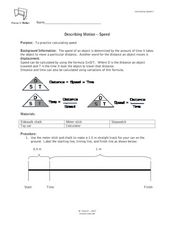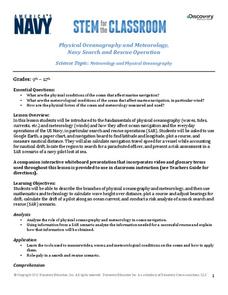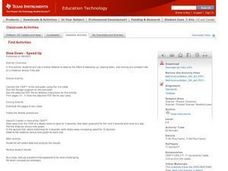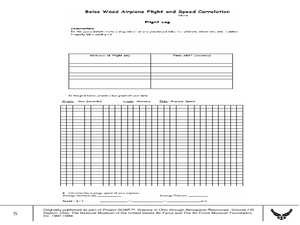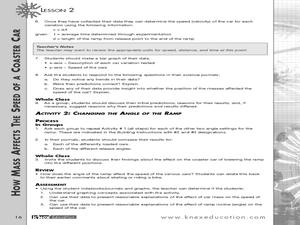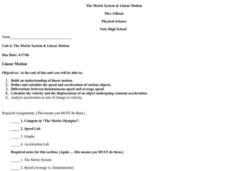Curated OER
Regents High School Examination - Physics 2010
Give every type of learner in your physics class an opportunity to demonstrate what they have learned throughout the year. From analyzing tables and graphs, to evaluating diagrams and solving problems, there is an outstanding variety of...
Curated OER
Physics
In this physics worksheet learners complete a series of multiple choice and short answer questions on force, magnitude, and energy. They complete calculations to solve word problems.
Curated OER
Tracking Speed
Young scholars calculate the speed of an object, by measuring the amount of time it takes to cover a given distance, and then divide: speed=distance/time. However, the object may not have been moving at a constant rate over the given...
Curated OER
Physics and Me
Sixth graders compare and contrast mass and weight. In this physics lesson, 6th graders calculate speed given distance and time information. They construct a rocket and relate this to Newton's 3rd Law of motion.
Curated OER
Calculating Stride Length
How many steps does one take to walk a mile? The number of steps one walks in a mile would definitely depend on the length of his stride. Shorter people may take shorter strides, and taller people may take longer strides. This activity...
Curated OER
Describing Motion-Speed
Pupils study speed and learn how to calculate it. In this investigative lesson students participate in an activity that shows them how to calculate speed then they fill out a worksheet.
Curated OER
The Physics of the Planets: How 16th and 17th Century Physicist Helped Us Understand Our Solar System
Eighth graders draw the paths of the planets in the solar system. In this astronomy lesson, 8th graders calculate speed of objects using distance and time information. They research about the work of scientists in the 16th and 17th century.
Discovery Education
Physical Oceanography and Meteorology, Navy Search and Rescue Operation
It's an ocean rescue mission! Groups must find a pilot downed off the coast of the Chesapeake Bay. Rescuers must determine the distance needed to travel as well as the heading to get to the pilot's last known position. Taking...
Curated OER
Motion: Speed, Velocity, Acceleration and Networking
Young scholars interpret a variety of motion graphs. In this physics lesson, students calculate the speed and acceleration of objects using numerical data from graphs. They apply what they have learned to solve real world problems.
Curated OER
Regents High School Examination PHYSICAL SETTING PHYSICS 2003
In this chemistry exam, physics pupils complete a series of multiple choice and short answer questions by completing calculations on speed, velocity, magnitude and inertia.
Curated OER
Wheeling It In!
Students use everyday materials (milk cartons, water bottles, pencils, straws, candy) to build a small-scale transportation device that incorporates the wheel and axle and the lever. They race their carts/trucks, measure distance, time...
Curated OER
Race the Track! Super Slope (Lesson One)
Fifth graders utilize basic physics concepts to calculate speed of an object set in motion from various heights. For this basic physics lesson, 5th graders make observations, calculations, record data, and conclusions throughout experiment.
Curated OER
Speed of Sound
Students examine the phenomenon of sounds traveling slower than light. They discover why they see things before they hear them and how to estimate the speed of sound as homework.
Curated OER
Slow Down - Speed Up
Pupils explore the concept of distance and time as they use a CBR to mimic distance v. time graphs. Learners walk towards and away from the monitor to create various distance v. time graphs, then discuss what motion creates certain graphs.
Curated OER
What's Your Speed?
Learners explore the concept of distance v. time. They use a CBR to collect data on their distance over time, then plot their data using a scatter plot and find an equation to model their data. Pupils discuss what if scenarios which...
Curated OER
Balsa Wood Airplane Flight and Speed Correlation
Ninth graders calculate the average speed of their balsa wood airplane. In this physics lesson, 9th graders build their own airplane and make necessary modifications to to make it fly straight. They interpret distance and time graph...
Curated OER
Physics Rewind
Eighth graders differentiate speed and velocity. In this physics lesson, 8th graders explain Newton's laws of motion. They calculate speed using a mathematical formula.
Curated OER
How Mass Affects the Speed of a Coaster Car
Students determine what factors affect the speed of the car. In this physics lesson, students calculate speed, velocity and acceleration from experimental data. They construct and interpret motion graphs.
Curated OER
Energy and Work: Transformation Through Engines
Students conduct a webquest on an energy source they chose. In this physics lesson, students design an experiment to determine the factors affecting potential and kinetic energy. They calculate speed and create distance vs. time graphs.
Curated OER
Don’t Sit Under the Apple Tree…You Might Become Famous
Students explore Newton's laws using CEENBoTs. In this physics lesson, students collect data and create tables and graphs. They calculate speed, acceleration and forces using mathematical formulas.
Curated OER
Balloon Powered Race Cars
Students examine Newton's Law of Motion and use the formula to calculate speed. In this laws of motion lesson students create a balloon powered car and calculate its speed and distance.
Curated OER
Projectile Motion
Students observe projectile motion and calculate the speed of a baseball based on the time and distance traveled. They record the time, measure the distance, and draw the path of the ball's travel on a data table.
Curated OER
Vernier - A Speedy Slide with EasyData™ App and CBR 2™
Mathematicians use a CBR 2™ motion detector to determine their speed or velocity going down a playground slide. They also experiment with different ways to increase their speed going down the slide. Finally, students complete the Student...
Curated OER
Linear Motion
Students are able to build an understanding of linear motion. They are able to define and calculate the speed and acceleration of various objects. Students are able to differentiate betweeen instantaneous speed and average speed. They...





